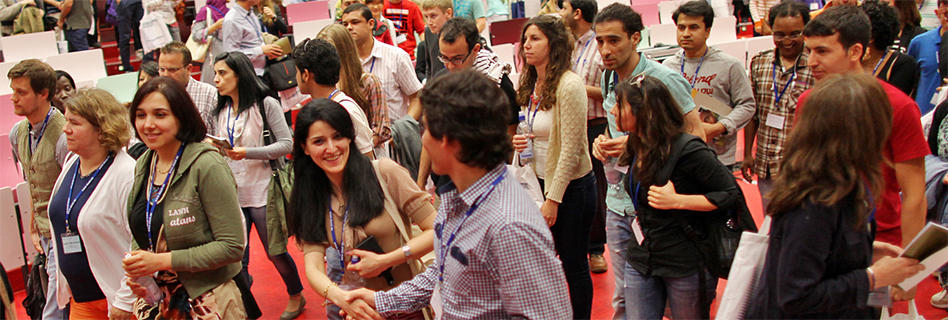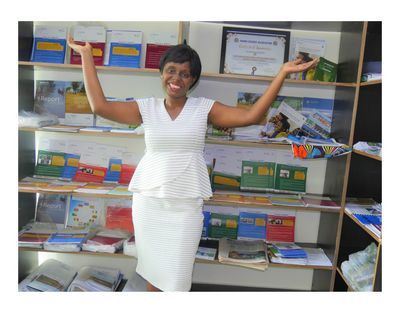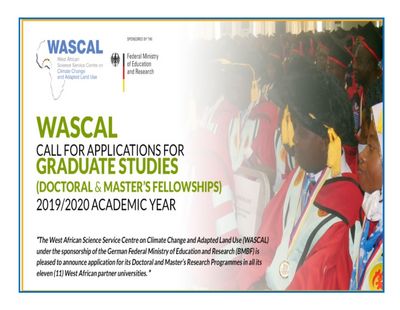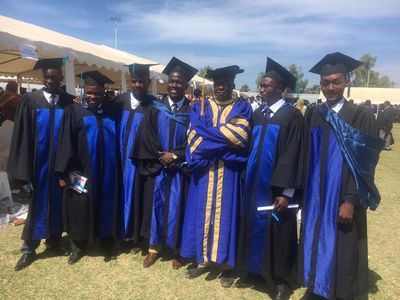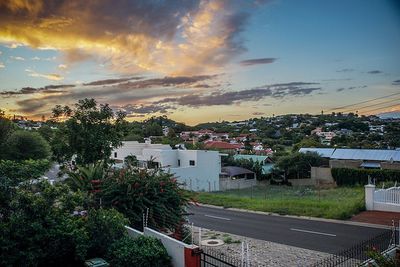Climate research alumni and postdocs in Africa (CLAPafrica) programme for the promotion of future leaders in the field of climate research and protection Background The DAAD has identified climate change Continue Reading
“WASCAL strongly believes in the potential of women. This is evident in the numerous and equal opportunities we have given women over the years. Fighting climate change within the sub-region demands a holistic approach. In the end women are hit hard by the hazardous effects of climate change. Leaving them out during the decision-making process creates a big vacuum in the whole efforts to combating climate change and improving livelihoods. So, on this day of International Women’s Day, we want to congratulate all the women in West Africa, particularly those in Climate Change. He further emphasized.
The reinforcement of integrating gender into climate change initiatives with the adoption of the first Gender Action Plan (GAP) 2017, are referred to as Parties. The Conference of Parties (COP) organized by the United Nations Framework Convention on Climate Change (UNFCCC) seeks to advance women’s full, equal and meaningful participation, and to promote gender-responsive climate policy.
Miss Alberta Aryee is a beneficiary scholar of the WASCAL Climate Change and Human Security run in partnership with the University of Lomé, Togo. On this august day, “I wish all women who are making strides to fight climate change from small holder farmers to scientists and lecturers all the best. I say “congratulations”! Let us continue to concentrate our efforts in climate change to attain sustainable development in Africa and the World at large.”
Announcement of regulations governing funding of the research supporting the “WASCAL II – West African Science Service Centre on Climate Change and Adapted Land Use” under the BMBF’s “Research for Sustainable Development” (FONA³) framework programme.
https://www.dropbox.com/sh/ioi0b0dbamofrqt/AABS7M_dmNLulX2x4QRv8pa0a/WASCAL2.0_Research%20Call_engl%20%28002%29.pdf?dl=0
https://www.dropbox.com/sh/ioi0b0dbamofrqt/AABoN3wDWVV6LbCfTs0aL3b9a/WASCAL2.0_Research%20Call_fr.pdf?dl=0
The West African Science Service Centre on Climate Change and Adapted Land Use (WASCAL) under the sponsorship of the German Federal Ministry of Education and Research (BMBF) is pleased to announce application for its Doctoral and Master’s Research Programmes in all its eleven (11) West African partner universities.
WASCAL is a wholly West African international organization with focus on academic and transdisciplinary research, building graduate-level scientific capacity and serving policy makers in West Africa with science-based advice on adaptation to climate change impacts and land use management. It cooperates with many agencies and universities in the region, providing a knowledge platform of excellence for its partners. WASCAL is funded by BMBF, multilateral and bilateral partners and its 11 West African member countries, namely: Benin, Burkina Faso, Cabo Verde, Cote d’Ivoire, Ghana, The Gambia, Mali, Niger, Nigeria, Senegal and Togo.
WASCAL’s mission is to provide information and knowledge services at the local, national and regional levels to West African member countries to cope with the adverse impacts of climate change. We do this through capacity building support to young West African scholars in fields of climate, natural and social sciences and by delivering climate and environmental services in member countries.
Please, find links to the various Universities below;
1.University d’ Abommey Calavi, Benin
Weblink: https://www.wascal.org/graduate-programmes/climate-change-and-water-resources/
2.University of Cheikh Anta Diop, Senegal
Weblink: https://www.wascal.org/graduate-programmes/climate-change-economics/
3. Université des Sciences, des Techniques et des Technologies de Bamako (USTTB) – Mali; Institut Polytechnique Rural de Formation et de Recherche Appliquée (IPR/IFRA)Mali and Cape Cost (Ghana)
Weblink: https://www.wascal.org/graduate-programmes/climate-change-and-agriculture/
4. University Felix Houphouet Boigny, Cote d’Ivoire
Weblink: https://www.wascal.org/graduate-programmes/climate-change-and-biodiversity/
5. University of Lome, Togo
Weblink: https://www.wascal.org/graduate-programmes/climate-change-and-disaster-risks-management/
6. University Abdou Moumouni, Niger
Weblink: https://www.wascal.org/graduate-programmes/climate-change-and-energy/
7.Kwame Nkrumah University of Science and Technology (KNUST), Kumasi Accra
Weblink: https://www.wascal.org/graduate-programmes/climate-change-and-land-use/
8. Federal University of Technology Akure, Nigeria (FUTA) Nigeria
Weblink: https://www.wascal.org/graduate-programmes/west-african-climate-systems/
9. Federal University of Technology, Minna, Nigeria (FUTMinna), Nigeria
Website: https://www.wascal.org/graduate-programmes/climate-change-and-human-habitat/
10. University of Cape Verde
Weblink: https://www.wascal.org/graduate-programmes/climate-change-and-marine-sciences/
11. University of Ouagadougou 1 Pr. Joseph Ki-Zerbo Ouagadougou
Weblink: https://www.wascal.org/graduate-programmes/informatics-for-climate-change/
12. University of the Gambia
Weblink: https://www.wascal.org/graduate-programmes/climate-change-and-education/
The Gambian President and the University of the Gambia are thankful to the Federal Ministry of Education and Research (BMBF), for their tremendous supports given to the WASCAL’s Research Programme (Doctoral (Ph.D.) in Climate Change and Education) during the 11th Convocation of the University. All six (6) students of the 2nd Batch of WASCAL’s programme graduated and were opportune to have had a hand shake with the President of the Gambia.
2019-01-28 – 23:00h to 2019-09-13 – 09:45h
3rdWORLD SYMPOSIUM ON CLIMATE CHANGEADAPTATION(WSCCA-2019)Akure, Nigeria, 11-13 September 2019///BACKGROUNDClimate change is among the major challenges of moderntimes. As the Fifth Assessment Report (AR5) produced by the Intergovernmental Panel on Climate Change (IPCC) and the COP 24 recommendations callfrom action not only from government, but also from various stakeholders.Apart from the knowledge offered bymodelling and forecasts which allowsus to understand the problem and how it develops in the future, we need to know more about approaches, methods and tools, which may help us to cope with the social, economic and political problems posed by climate change now. In order words, we need to speed up developments in the field of climate change adaptation.It is against this background that the “3ndWorld Symposium on Climate Change Adaptation” is beingorganised. The event is a joint initiative by the Federal University of Technology in Akure, Nigeria, and the Research and Transfer Centre “Applications of Life Sciences” of the Hamburg University of Applied Sciences (Germany), in cooperation with the International Climate Change Information Programme (ICCIP).The Symposium will be a truly interdisciplinary event, covering some of the key areas in the field of climate change adaptation.The “3rdWorld Symposium on Climate Change Adaptation” will be held in Akure, Nigeria.It will focus on “climate changeadaptationto address poverty and ensure sustainable livelihoods”, and will contribute to the further development of this fast-growing field. ///AIMS Consistent with the need for more cross-sectoral interactions among the various stakeholders working in the field of climate change adaptation, the aims of the “3rdWorld Symposium on Climate Change Adaptation” are as follows:i.to provide research institutions, universities, NGOs and enterprises all round the world with an opportunity to display and present their works in the field of climate change adaptation;ii.to foster the exchange of information, ideas and experiences acquired in the execution of climate change adaptation projects, especially successful initiatives and good practice;iii.to discuss methodological approaches and experiences deriving from case studies and projects,which aim to show how the principles of climate change adaptation may be implemented in practice;iv.to network the participants and provide a platform so they can explore possibilities for cooperation.Last but not least, a further aim of the event will be to document and disseminate the wealth of experiences on climate change adaptation available today across the world. To this
4280290496:5
3purpose,the book “Climate Change Adaptation: addressing poverty and ensuring sustainable livelihoods”will be published, with all accepted papers.This will be a further volume of the award-winning book series “Climate Change Management” published by Springer,which since its creation in 2008 has become the world ́s leading book series on climate change management. In addition, a set of papers selected by the coordination teamwill be published ina special issue of the International Journal of Climate Change Strategies and Management(a fully indexed journal, also at ISI /Thomson Reuters).The decision of the editors as to which papers may be selected -and undergo peer review-for the book and for the special issue of the journal, is final.///PROFILE OF PARTICIPANTSDelegates attending the “3rdWorld Symposiumon Climate Change Adaptation” will come from a cross-sectoral range of areas, from both industrialised and developing countries. They are:i.officials at city, regional and national level concerned with climate changeii.members of NGOs working with climate change;iii.researchersat universities and research centres;iv.teaching staff at universities;v.representatives from companies vi.representatives from development agencies working with climate change adaptation and executing projects on the ground;vii.project officers and consultants;viii.other people interested in the field.The participation of doctoral students is warmly encouraged and supervisors/advisers are kindly requested to facilitate their participation.The sort of international exposure and the rich content of this Symposium will be beneficial to their work,and their careers.It is believed that this wide range of participants will help to outline the need for and the usefulness of integrated approaches towards climate change adaptation and, hence contributeto the further consolidation of this thematic area.///STRUCTURE OF THE EVENTThe “3rdWorld Symposium on Climate Change Adaptation” isorganised in two main strands:Strand 1: the posters Participating and organisations will be able to put-up posters describing their works and projects,and to distribute the relevant information to the participants. The posters will allow close, one-to-one contacts between the participants and the exhibitors.Strand 2: the presentationsA set of presentations, divided into six main themes will be organised, distributed over parallel sessions dealing with some of the issues of strategic value in the field of climate change adaptation. These are:
4280290496:5
4•Session 1) Climate Literacy, Information and Communication•Session 2) Technological approaches to Climate Change Adaptation/Innovative Approaches towards Low Carbon Economics•Session 3) Food Security and Climate Change: Adapting Agriculture to Climate Change•Session 4) Climate Change and Health•Session 5) Climate Change Adaptation, Resilience Extreme Events/Climate Change and Disaster Risk Management•Session 6) Climate Change Policy and Governance•Session 7) Implementing Climate Change Adaptation in Communities, Cities, Countries and via Outreach ProgrammesA final session, to be held on Friday, will close the event and will lead to an Award being given to the best papers.///TIME-TABLEThe schedule of the “3rdWorld Symposium on Climate Change Adaptation” is as follows:WEDNESDAY 11hSEPTEMBER 2019(morning)WEDNESDAY 11thSEPTEMBER 2019(afternoon)Morning:Arrival and set-up of displays 14:00-17:00-Plenary SessionEvening:Reception THRUSDAY 12thSEPTEMBER 2019FRIDAY, 13thSEPTEMBER 2019All day:Exhibition and visit to displaysMorning:Plenary and Sessions Afternoon:Plenary and SessionsEvening:DinnerAll day:Exhibition and visit to displaysMorning:Plenary and Sessions, Round-table with key experts & ConclusionsAfternoon: 14:00-Final Session and hand over of the Best Paper AwardsIn order to ensure an efficient use of the time, delegates are kindly asked to organisetheir travel in a way that allows them to arrive in Akure in the course of Wednesdaythe11thSeptember 2019at the latest, and travel back on or after the 13thSeptember 2019, so they can fully take part in the Symposium.
4280290496:5
5The mixture of plenary and parallel sessions, as well as the social events,will provide participants with an outstanding opportunity to interact, networkand learn about the latest ideas, projectsand practices aimed at mainstreaming climate change adaptation, worldwide.///DEADLINESDeadline for submission of abstracts: 10th April 2019Deadline for submission of papers: 20th June 2019 Deadline for the submission of revised papers: 20th July 2019Deadline for registrations: 30th July 2019 Since the conference book is expected to be launched shortly after the event, the deadlines need to be followed.///FEES AND CHARGESA discounted fee of € 250(plus 19%VAT) will be charged to delegateswho register until 30thJanuary 2019(early bird registration). After that, delegates will need to pay the full fee of € 300 (plus 19% VAT). The reduced fee for MSc/PhD students is € 100. The feeincludes free lunches and coffee breaks on 11th-13thSeptember 2019and free electronic access to the book“Climate Change Adaptation: addressing poverty and ensuring sustainable livelihoods”,expected to be launched soon after the Symposium.Interested people andorganisations are encouraged to register by completing the application form provided. This is a self-funded event and the organisers are unable to pay any travel or accommodation costsof any kind. They are however happy to issue letters of invitation to support delegates to request funding for their participation. ///ORGANISERS•The Federal Universityof Technology, Akure, Nigeria•Hamburg University of Applied Sciences,Research and Transfer Centre “Applications of Life Sciences”•International Climate Change Information Programme (ICCIP)•WorldFish Centre (WFC)///NATIONAL AND INTERNATIONAL PARTNERS•UN Educational, Scientific and Cultural Organisation (UNESCO)•UN Environment Programme (UNEP)•World Health Organisation(WHO)•World Meteorological Organisation(WMO)•International Climate Change Information Programme (ICCIP)
4280290496:5
6///SCIENTIFIC COMMITTEECo-Chairs •Prof. Walter Leal, School of Science and the Environment, Manchester Metropolitan University, UK, & HAW Hamburg, Germany•Dr. Adeleke Mosunmola Lydia, School of Agriculture and Agricultural Technology, The Federal University of Technology, Akure, NigeriaMembersProf. Marco Akerman, School of Public Health at the University of São Paulo and Latin America Vice President of the International Union of Health Promotion and EducationProf. Xavier Medina UOC, Barcelona EspanhaProf. Javier Aliaga, Catholic University of Bolivia, BoliviaDr. Abul Quasem Al-Amin, University of Malaya, Malaysia Dr. Nelson Amaro, Galileo University, GuatemalaProf. Sandra Caeiro, Universidade Aberta, PortugalProf. Luís Miguel Nunes, Faculty of Sciences and Technology, University of Algarve, PortugalProf. Luiz Velazquez Contrera, University of Sonora, MexicoProf. Boaventura Chango Cuamba, Eduardo Mondlane University, MozambiqueDr. Alison Duffy, Abertay University, UKProf. Alexander Feher, Slovak University of Agriculture in Nitra, Slovakia.Prof. Amadou Gaye, University Cheikh Anta Diop de Dakar,SenegalProf. Plamen Gramatikov, University of Blageovgrad, Bulgaria Prof. Baltasar D ́Andrade Guerra, UNISUL, BrazilProf. Henning Sten Hansen, Aalborg University CopenhagenProf. Arvo IItal, Technical University of Tallin, EstoniaProf. Chardel Jabbour, University of São Paulo, BrazilProf. Seppo Helsten, Finnish Environment Institute, FinlandProf. Maris Klavins, University of Latvia, LatviaProf. Linas Kliucininkas, Kaunas University of Technology, LithuaniaDr. Evangelos Manolas, Democritus University of Thrace, GreeceProf. David Chávez Muñoz, Pontificia UniversidadCatólica del Perú, PeruProf. Justice Nyamangara, Chinhoyi University of Technology, ZimbabweProf Kehinde Ogunjobi-Director WASCAL DRP-WACS,Federal university of Technology, Akure, Nigeria.Prof. Nicholas Otienoh Oguge, University of Nairobi, KenyaProf. Osvaldo Quelhas, Fluminense Federal University, BrazilDr. Karuturi Rao, ICRISAT, EthiopiaProf. Julia Seixas, Universidade Nova de Lisboa, PortugalProf. Michael Shilin, Russian State Hydrometeorological University, RussiaProf. Anirudh Singh, University of the South Pacific, FijiProf. Luis Vargas, University of Chile, ChileProf. Luis Velazquez, University of Sonora, MexicoProf. Menas Wuta, University of Zimbabwe, Zimbabwe
4280290496:5
7///SCIENTIFIC AND EXECUTIVE COMMITTEE AT THE FEDERAL UNIVERSITYOF TECHNOLOGY, AKUREMembersProf. Taiwo T. Amos, (Chairman) School of Agriculture and Agricultural Technology, The Federal University of Technology, Akure, Nigeria; Prof. Oyedapo A. Fagbenro, School of Agriculture and Agricultural Technology, The Federal University of Technology, Akure, Nigeria;Prof. Olabode T. Adebayo, School of Agriculture and Agricultural Technology, The Federal University of Technology, Akure, Nigeria;Prof. Ahmed A. Balogun, West African School on Climate and Adapted Land Use, The Federal University of Technology, Akure, Nigeria;Dr. Ife A. Balogun, Centre for Space Research and Application, The Federal University of Technology, Akure, Nigeria; Dr. M. Lydia Adeleke, School of Agriculture and Agricultural Technology, The Federal University of Technology, Akure, Nigeria; andDr. Harrison Charo Karisa, WorldFish Country Director, Egypt and Nigeria.///CONTACT POINT FORSCIENTIFIC INPUTS, STRATEGIC COOPERATION AND GUIDANCE ON PUBLICATIONAll questions related to scientific inputs and strategic partnershipsshould be sent to:Walter Leal (BSc, PhD, DSc, DPhil, DEd, DLitt, FSB, FRGS, FLS)Professor of Environment and TechnologySchool of Science and the EnvironmentE-mail: w.leal@mmu.ac.ukAll questions related to abstracts, should be sent to:Svenja Scheday: info@iccip.net///CONFERENCE ADMINISTRATOR AND CONTACT POINT FOR FURTHER DETAILSAll questions related to registrations should be sent to:Dr. Mihaela SimaInstitute of GeographyRomanian Academy E-mail: simamik@yahoo.com
4280290496:5
8HOW TO SUBMIT AN ABSTRACT An abstract should be up to 200 words, it should describe the rationale and aims of the paper, and some of its results. General descriptions of broad contexts should be avoided. The full contact details about the author(s) need to be provided. Abstracts should be written in the third person and not in the first or second one (e.g. I, me, or my paper). Please see below a sample abstract. Authors whose abstracts have been accepted, will receive further details about how to submit their full papers, and further logistical information.SAMPLE ABSTRACT(PLEASE SEND YOUR ABSTRACT EXACTLY WITH THE FORMAT BELOW TO:Dr Jelena Barbir:jelena@barbir.com.es)Promoting Climate Change Adaptation in Developing Countries: breaking misconceptions and addressing information needsWalter Leal (BSc, PhD, DSc, DPhil, DEd, DLitt, FSB, FRGS, FLS)School of Scienceand the EnvironmentManchester Metropolitan UniversityChester StreetManchester, M1 5GDUnited KingdomE-mail: info@iccip.netAbstractThe impacts of climate change to natural ecosystems, infra-structure and livelihood, means that the implementation of climate change adaptation strategies in developing countries has become a pressing issue. Among other factors, the undertaking of adaptation strategies is made difficult by the general lack of awareness and spread misconceptions about the real impacts of climate change which, in turn, slow down the execution of the adaptation initiatives needed, and which may ameliorate them. This paper presents an analysis about the misconceptions related to the implementation of climate change adaptation strategies, and describes the most widespread ones, as well as their implications. A special emphasis is given to the problems and barriers caused by misinformation, which –in turn-prevent the promotion of adaptation initiatives at local level. Finally, some concrete steps which may be taken in order to break the misconceptions and foster a more systematic view of adaptation strategies, are outlined. Experiences gathered in this paper will be useful to people and organisations interested in the different levels of responses given to climate changes threats, and on some of the tools which may be used to encourage specific action to adapt to changing climate conditions
On 14-15 November, 2018, members of the West African Science Service Center on Climate Change and Adapted Land Use (WASCAL) and the African Monsoon Multidisciplinary Analysis 2050 (AMMA-2050) came together with city, national and regional decision makers to develop a roadmap to strengthen linkages between researchers and policymakers in West Africa. The workshop took place at the WASCAL Competence Centre in Ouagadougou, Burkina Faso.
With a focus on open discussion, most of the workshop took place through exercises undertaken in small groups that drew in the wealth of the expertise present. Groups conducted problem tree analysis and network mapping to uncover the underlying reasons for missing links between researchers and policymakers in enabling climate science to better support decision-making in West Africa. Keynote presentations focused on strengthening resilience to climate-related risks within the disaster risk reduction and agricultural sectors across West Africa. Participants identified researchers’ capacities, technical support to policy makers, and resources for strengthened science-policy-practice engagements as key opportunity areas.
One group’s problem tree analysis of ‘What are the missing links between researchers and decision makers to enable climate science to better support decision-making in West Africa?’.
Three knowledge-exchange approaches were discussed to bridge the science-policy divide. The first was the use of a board game, the ‘Plateau Game’, to gather and share potential impacts of future climate change. The second approach was a form of participatory theatre, called ‘Theatre Forum’, employed to discuss power relations between different actors. The third was the ‘Innovation Platform’ approach where networks of actors concerned with a particular value chain collectively consider technical, social and institutional constraints in order to create innovation. The successful use of these approaches demonstrated that games and theatre can be entertaining and effective ways to engage with decision makers.
Farmers playing Plateau Game. Source: CIRAD
Workshop participants also proposed practical steps for WASCAL to strengthen its engagement with policy makers, including:
Incentivising researchers to engage with policy- and decision makers;
Developing a module on communication and policy engagement in WASCAL graduate schools;
Reinforcing WASCAL’s Public Relations Office and Communications Unit, strengthening the organisation’s Communication Strategy with multiple approaches for public engagement and dialogue;
Establishing a science-policy broker in WASCAL to identify entry points and develop tailored messages for key policy processes, as well as monitoring and responding to significant emerging issues, such as major flood events;
Strengthening WASCAL’s Memoranda of Understanding with partnering institutions;
Identifying regular opportunities for ongoing training and sharing of emerging learning on approaches that support effective science engagement with policy- and decision makers;
Conducting a survey of decision makers’ perceptions of WASCAL, undertaking a cost-benefit analysis to demonstrate the value of evidence-based policy making, and developing a joint training for policy makers with the Economic Community of West African States (ECOWAS) to strengthen their capacities to make effective use of scientific findings.
While the challenge of the science-policy divide is often raised, few events seriously address it or provide practical ways of strengthening researcher engagement with policy makers. Dr Arona Diedhiou, Chair of the WASCAL Scientific Advisory Committee (SAC), recognised the workshop as a significant initiative for developing strategic regional linkages between researchers and policymakers.
The full workshop report is publicly available here.
Theatre Forum Organized in Senegal. source: ISRA, Senegal
Vice President Ousainou Darboe has affirmed that in line with the national development policies, President Adama Barrow administration is willing to support all efforts geared towards reducing the impact of climate change.
He said that there is no longer any doubt that human activities cause serious global warning yet human being are a threat to the environment, so is climate change a direct threat to human and a source of many other threats and disasters. These remarks were made during a two-day seminar on ‘Climate Change and Renewable Energy’ and ‘Climate Change and Land Use’ which was jointly organised by the Ministry of Higher Education, Research, Science and technology (MoHERST) in collaboration with the University of The Gambia (UTG). The programme was funded by the German Ministry of Higher Education and Research Science (BMBF) held at a hotel in Bakau. “Climate change is acknowledged as a growing threat to the environment, livelihood, food security and economic growth; thus food insecurity for instance comes with economic risk as scarcity of staple crops cause crises in prises,” he stressed.
In the Gambia specifically, the vice president stated that food insecurity cause a serious threat as a result of acute erratic rainfall patterns, draughts and floods all of which can be associated with climate change. He said “Some of which force our rural farming population especially the youths to abandon the agricultural lands and move to urban areas thereby increasing the population and unemployment”.
He further pointed out that climate change also contributes to irregular migration to Europe as the youths explore opportunities elsewhere.
The Vice President reminded that the seminar serves as an important step towards implementing The Gambia’s commitments on the 21st conference of parties of UN conference on climate change held in Paris in 2015” he stated. For his part, Badara Joof, the minister of MoHERST said that they should go beyond the seminar and generate issues of climate change and the environmental impact that it has. “I want to domesticate this within the context of the UTG where we would domesticate the knowledge that we would gain from Germany and WASCAL, index it into the Faculty of Research on Climate Change and Environmental Management” he said.
He added that it will enable them to maintain the knowledge since they know that they are having challenges of environmental issues. “It is part of the policy changes and the orientations of the UTG and MoHERST policy in general that research is as important and crucial to things because if we are teaching for the future,” he elaborated.
Senior Scientist in climate modeling and climate change of WASCAL, Dr. Mouhamadou Bamba Sylla has represented WASCAL at the just ended 7th Conference on Climate Change and Development in Africa (CCDVII), which took place in Kenya’s capital, Nairobi.
As a member of the panel discussion on “Climate Information Services in support to the NDCs”, Dr. Sylla advocated for a stronger continental political leadership for the generation of knowledge about the climate change impacts of 1.5oC and 2oC global warming on development sectors of Africa; the strengthening of the National Meteorological Services for a free and open access data culture as well as the development of robust climate information at different timescales for supporting the NDCs implementation.
CCDVII was under the theme “Supporting the Implementation of the Paris Agreement in Africa: From Policies to Action”. The three-day conference brought together stakeholders from governmental, scientific and academic divides such as the universities, regional climate centres and research centers; civil societies, development partners and private sectors, to examine Africa’s Nationally Determined Contributions (NDCs) and to define actionable climate interventions.
The Conference on Climate Change and Development in Africa was organized by the United Nations Economic Commission (UNECA) for Africa in partnership with the Pan-African Climate Justice Alliance (PACJA).
Watch excerpt interviews of CCDVII and media interview of Dr. Sylla
https://www.youtube.com/watch?v=S8ZxxQC-4HA
The German Federal Ministry of Education and Research (BMBF) in partnership with the West African Science Service Centre on Climate Change and Adapted Land Use (WASCAL) is funding a feasibility study on renewable energies development, for a Pilot Project implementation in Ghana.
Dr Christoph Rövekamp, the Head of Division 722 Basic Energy Research at the German Federal Ministry of Education and Research (BMBF), announced this at the opening section of a regional stakeholders’ consultation workshop held in Accra-Ghana on Thursday, July 26th, 2018. He said funding from the Federal Ministry of Education and Research (BMBF), would support a joint scientific team of experts from research institutions in Ghana and Germany to seek inputs from, and to collaborate with industry and civil society in the energy sector, including the Energy Commission, Electricity Company of Ghana, GRIDCo, the Kumasi Institute of Technology Energy and Environment (KITE), the Council for Scientific and Industrial Research (CSIR), the Centre for Climate Change and Gender Studies of the University of Energy and Natural Resources at Sunyani, the Department of Agricultural and Biosystems Engineering at KNUST, the Institute of Statistical, Social and Economic Research, University of Ghana Legon, and a research institution based in Germany. Dr Rovekamp explained that the broad objective of the feasibility study was to conduct a detailed technical and financial assessment of renewable energies, focusing on technologies and their applications in all sectors of the country, and to produce a comprehensive report. He said it was envisaged that a period of six months (July to December 2018), was required to undertake all the three phases of the assessment, including the two workshops and production of the feasibility study report.
Mr Fredrick Appiah, the Chief Programmes Officer at the Energy Commission, said the country was currently considering other cheaper energy sources as hydro power had become unsustainable due to the impact of climate change on the environment. Hence the various interventions including the Renewable Energy Act 832, has paved the way for private sector participation, while the Fund set for this purpose was yet to be operationalized.
Dr Savadogo, the Executive Director of WASCAL, expressed appreciation to the donors for getting the project on course.
Mr. Hans-Helge Sander, the Deputy Head of Missions of the Federal Republic of Germany to Ghana, underscored the importance of renewable energy mix into the country’s electricity grid to ensure sustainable power supply for national development. He however said there was no need to reinvent the wheel which could result in duplications, but urged the experts to build on existing programmes, sourcing for available data and information from institutions that were already working on similar projects, in order to identify the gaps that needed to be addressed. He urged the researchers to also explore new areas such as technology transfer, as well as the limitations of Ghana’s Local Content Law on renewable energy, and its effect on industry. Mr Sander expressed his appreciation to the Energy Commission for Championing the Project, and the CSIR and other stakeholder institutions for their partnership.
The Ministry of Environment Science Technology and Innovation (MESTI) would however, provide the overall coordination and management of the project activities, ensuring that all deliverables were provided timely and according to design.
The German Federal Ministry of Education and Research (BMBF) in partnership with the West African Science Service Centre on Climate Change and Adapted Land Use (WASCAL) is funding a feasibility Continue Reading
The Head of Division “Global Change” at the German Federal Ministry of Education and Research (BMBF), Prof. Rene Haak has stated that one of the key aims of the international cooperation between Germany and Africa is to strengthen the science base in Africa by supporting local capacities and developing and combining their respective scientific joint efforts.
In his speech he said, “with the support of my Ministry, WASCAL enhanced the visibility of science from Africa into the international scientific networks and into long-lasting cooperation between African and German universities and research institutes.” He was speaking at the opening session of the inaugural edition of the WASCAL Science Symposium in Accra. Prof. Haak acknowledged that WASCAL had provided a great supporting role by setting up and coordinating new integrated regional research activities in the area of sustainable land use, water resource management, Biodiversity, renewable Energy, agriculture, human security, climate systems and economics with the latest focus on data management and Marine research.
Prof. Haak urged WASCAL to intensify in their cooperation efforts with national, regional and international partners. “As we move on he said, WASCAL needs to become stronger in interacting with policy makers and other regional and national authorities by providing scientifically-sound and realistic options for making land management resilient to climate change.”
He further emphasized BMBF’s immense contribution towards the success of WASCAL and its sister organization, SASSCAL. “As BMBF, we try to support our partners from Africa in building up scientific structures and educational and research capacities in a variety of ways. The two Climate Competence Centres – WASCAL and SASSCAL – are cornerstones of our collaboration in the areas of academic education, research cooperation and research infrastructure.”
“WASCAL, for example, has made considerable progress in increasing the density of measuring networks through cross-border planning and installing automatic weather stations in the region. The data obtained is made directly available for service development through the WASCAL Data Initiative WADI at the Competence Centre. It is also used in WASCAL partner countries where we implement the regional research programme. In this way, the countries are establishing a joint regional basis; for example, for cross-border early warning systems in the event of floods or for the coordinated observation of changes in land use.” He stated.
He also entreated partner countries to show commitment by giving to WASCAL and SASSCAL, a long-term perspective through their involvement in regional cooperation structures; linking them up with national research institutions and programs and, by providing own funding for their operations. We have established WASCAL and SASSCAL with this aim in mind, and I can assure you that, in this spirit, we will continue to be a reliable partner for West Africa and beyond this, for the entire African continent.
He finally exalted that the Symposium will offer interesting presentations and ideas and that will give exciting insights into the fruits of German-African research cooperation. The WASCAL Science Symposium is the maiden event of WASCAL that seeks to showcase the achievements of the organization and interact with global scientists in the fight against climate change in West Africa.


